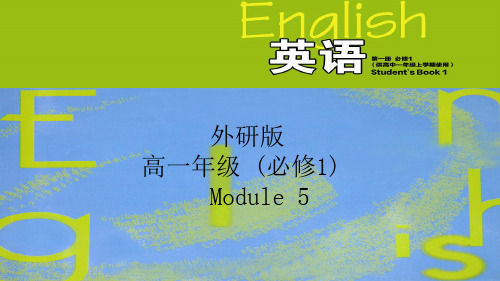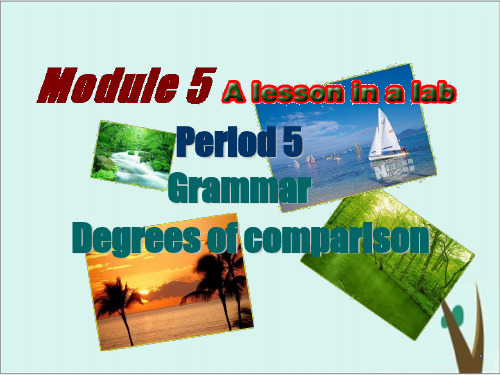外研版高一英语必修一第五单元Module-5-A-lesson-in-a-Lab
- 格式:pptx
- 大小:3.15 MB
- 文档页数:135

高中英语学习材料***鼎尚图文理制作***Module 5 A Lesson in a LabⅠ.单词拼写1.At the news that his favourite star took drugs, he was too ________ (吃惊的) to speak.2.The air in the balloon ________ (膨胀) when heated.3.Switch off the ________ (电)before you attempt any repair.4.The government has an interest in importing scientific ______ (设备).5.The house Osama bin Laden once lived in looked ________ (普通的).6.The interview will give you a chance to ________ (形成) an impression of the company.7.The white pollution has upset the ecological ________ (平衡) in the lake.8.New research shows that an excess of meat and salt can ________ (收缩) muscles.9.Iron ________ (反应) with water and air to produce rust.10.When the water ________ (煮沸),add the rice.Ⅱ.单项填空1.When we use metals, ________ is important to know how they react with different substances, for example, water and oxygen.A.as B.this C.that D.it2.________ I read, ________ I learn.A.The many books; the much informationB.The more books; the more informationC.The more books; the less informationD.The fewer books; the more information3.(2012·双鸭山模拟)—May I put my luggage on the seat beside you, sir?—________.A.With pleasure B.Go aheadC.Never mind D.Take it easy4.________,I would like to thank everyone who helped to make this event possible.A.In conclusion B.In funC.In word D.In case5.The government should pay more attention to the needs of ________ citizens.A.normal B.ordinaryC.usual D.general6.(2012·临沂模拟)The middle-aged woman joined the gym club with the ________ of losing weight.A.aim B.help C.access D.surprise7.The newly-built bridge ________ the beauty of the city.A. adds up toB. adds toC. adds upD. is added to8. I ________ very late during the summer vacation, but now I ________ up very early.A.am used to rise;am used to gettingB.am used to rise;used to gettingC.used to rise;am used to gettingD.used to rise;used to get9.She had to hold onto the table to ________ her balance.A.keep B.lose C.upset D.affectⅢ.阅读理解Children start out as natural scientists, eager to look into the world around them. Helping them enjoy science can be easy; there's no need for a lot of scientific terms or expensive lab equipment. You only have to share your children's curiosity (好奇). Firstly, listen to their questions. I once visited a classroom of seven-year-olds to talk about science as a job. The children asked me “textbook questions” about schooling, salary (薪水) and whether I liked my job. When I finished answering, we sat facing one another in silence. Finally I said,“Now that we've finished with your lists,_do you have questions of your own about science?”After a long pause, a boy raised his hand, “Have you ever seen a grasshopper (蚱蜢)eat? When I try eating leaves like that,I get a stomachache. Why?”This began a set of questions that lasted nearly two hours.Secondly,give them time to think. Studies over the past 30 years have shown that,after asking a question, adults typically wait only one second or less for an answer, no time for a child to think. When adults increase their “wait time” to three seconds or more, children give more logical(符合逻辑的), complete and creative answers.Thirdly, watch your language. Once you have a child involved in a science discussion,don't jump in with “That's right” or “Very good”. These words work well when it comes to encouraging good behaviour (行为). But in talking about science,quick praise can signal that discussion is over. Instead, keep things going by saying “That's interesting” or “I'd never thought of it that way before”,or coming up with more questions or ideas.Never push a child to “think”. It doesn't make sense. Children are always thinking,without your telling them to. What's more, this can turn a conversation into a performance. The child will try to find the answer you want,in as few words as possible,so that he will be a smaller target(目标)for your disagreement.Lastly, show; don't tell. Real-life impressions of nature are far more impressive than any lesson children can learn from a book or a television program. Let children look at their fingertips through a magnifying glass (放大镜) ,and they'll understand why you want them to wash before dinner. Rather than saying that water evaporates(蒸发), set a pot of water to boil and let them watch the water level drop.1. According to the passage, children are natural scientists, and to raise their interest, the most important thing for adults to do is ________.A.to let them see the world aroundB. to share the children's curiosityC. to explain difficult phrases about scienceD. to supply the children with lab equipment2.In the last sentence of the first paragraph, the underlined word “lists”could best be replaced by ________.A.any questionsB.any problemsC.questions from textbooksD.any number of questions3.According to the passage, children can answer questions in a more logical, complete and creative way if adults ________.A.ask them to answer quicklyB.wait for one or two seconds after a questionC.tell them to answer the next dayD.wait at least for three seconds after a question敬请批评指正。
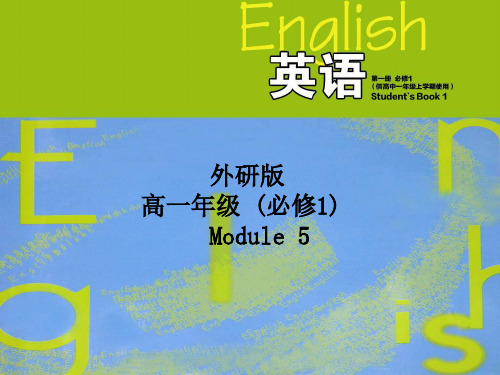


Module 5 A Lesson in a Lab一、刷黑板——词汇全听写(先过识记默写关)Ⅰ.阅读词汇(英译汉)[第一屏听写]1.liquid n.液体2.contract vi. 收缩3.substance n. 物质4.oxygen n. 氧气5.rust vi. 生锈[第二屏听写]6.partial adj. 部分的;局部的7.steam n. 蒸汽;水汽8.flame n. 火焰9.potassium n. 钾10.sodium n. 钠[第三屏听写]11.calcium n.钙12.magnesium n. 镁13.aluminium n. 铝14.zinc n. 锌15.copper n. 铜[第四屏听写]16.oxide n.氧化物17.dissolve vi. 溶解;分解;分离18.crucible n. 坩埚19.tongs n. (复)夹子;小钳子Ⅱ.高频词汇(汉译英)[第五屏听写]1.expand vi. 膨胀2.mixture n. 混合物3.electricity n.电4.stage n. 阶段;时期5.conclusion n. 结论[第六屏听写]6.aim n.目标;目的7.reaction n. 反应8.electrical adj. 与电有关的;用电的9.equipment n. 设备;装备10.react vi. (化学)反应[第七屏听写]11.ordinary adj. 普通的;平常的12.form vi. 形成13.balance n. 天平14.lecture n. 演讲15.department n. (大学的)科、系[第八屏听写]16.astonished adj. 吃惊的;惊愕的17.float vi. 漂浮18.facility n. (常作复数)设备;工具19.boil vt. 煮;煮沸20.add_..._to_... 往……加入……[第九屏听写]21.used_to 过去(常常)22.in_the_area_of 在……领域23.be_proud_of 为……感到骄傲/自豪24.be_supposed_to 应当;理应二、刷清单——热身自盘点(再过基本应用关)(一)核心单词。
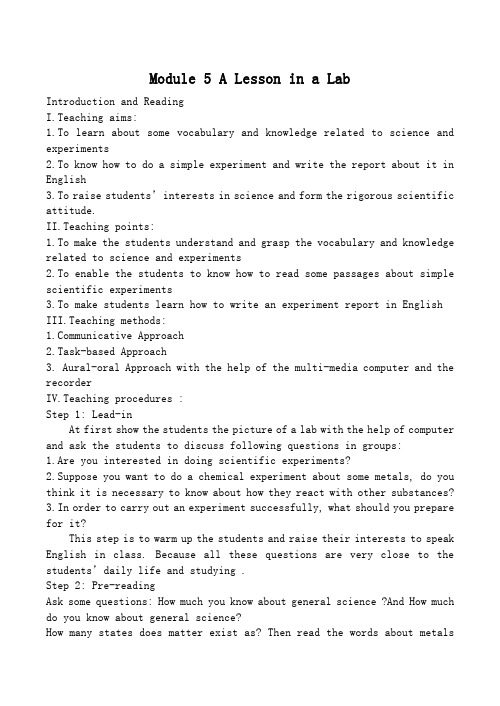
Module 5 A Lesson in a LabIntroduction and ReadingI.Teaching aims:1.To learn about some vocabulary and knowledge related to science and experiments2.To know how to do a simple experiment and write the report about it in English3.To raise students’interests in science and form the rigorous scientific attitude.II.Teaching points:1.To make the students understand and grasp the vocabulary and knowledge related to science and experiments2.To enable the students to know how to read some passages about simple scientific experiments3.To make students learn how to write an experiment report in English III.Teaching methods:municative Approach2.Task-based Approach3. Aural-oral Approach with the help of the multi-media computer and the recorderIV.Teaching procedures :Step 1: Lead-inAt first show the students the picture of a lab with the help of computer and ask the students to discuss following questions in groups:1.Are you interested in doing scientific experiments?2.Suppose you want to do a chemical experiment about some metals, do you think it is necessary to know about how they react with other substances?3.In order to carry out an experiment successfully, what should you prepare for it?This step is to warm up the students and raise their interests to speak English in class. Because all these questions are very close to the students’daily life and studying .Step 2: Pre-readingAsk some questions: How much you know about general science ?And How much do you know about general science?How many states does matter exist as? Then read the words about metalstogether.Step 3: ReadingPassage A1. Listen to passage A quickly and choose the best title for it.2. Read passage A carefully and answer1). Which of the metals in the table reacts the most with oxygen and water?2). What happens when you heat calcium in oxygen?3). Which metals react with steam?4). Does iron have a slow or fast reaction with steam?5). Does copper react with water?Passage B1. Some important words about the experiment2. Put these words in the correct order to describe the stages of a scientific experiment.3. Read Passage B, tell the stagesStep 4:DiscussionSince we have known about how to do a scientific experiment, l et’s do a simple experiment to test if magnesium can burn in the air and write a short report.V.HomeworkGo into your science lab and tell your class the apparatus.。
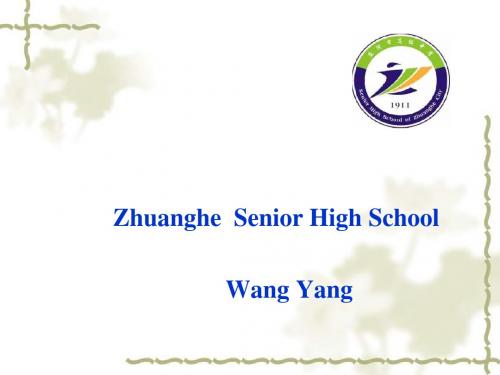
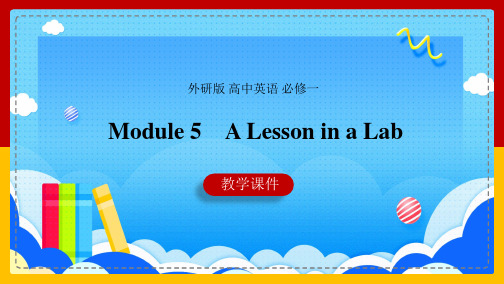
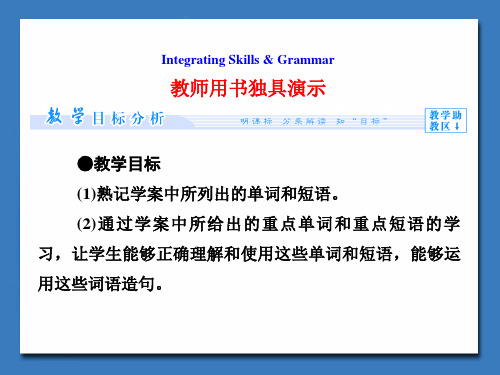

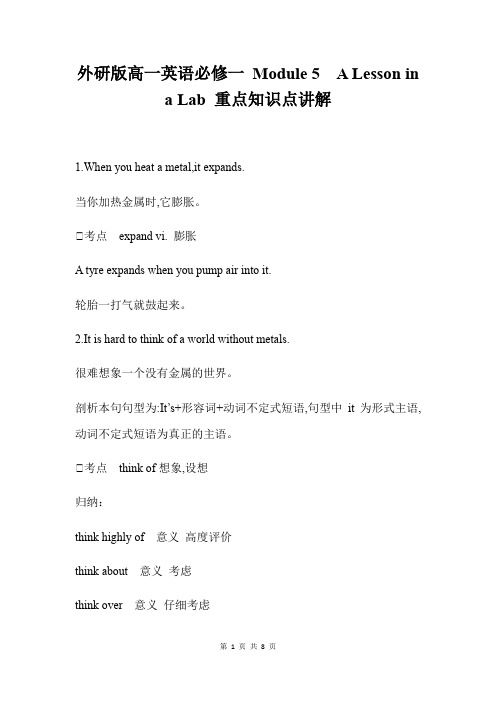
外研版高一英语必修一Module 5 A Lesson ina Lab 重点知识点讲解1.When you heat a metal,it expands.当你加热金属时,它膨胀。
★考点expand vi. 膨胀A tyre expands when you pump air into it.轮胎一打气就鼓起来。
2.It is hard to think of a world without metals.很难想象一个没有金属的世界。
剖析本句句型为:It’s+形容词+动词不定式短语,句型中it为形式主语,动词不定式短语为真正的主语。
★考点think of想象,设想归纳:think highly of意义高度评价think about意义考虑think over意义仔细考虑3.Different metals have different uses,for example,steel is used in cars,and iron is used in electrical equipment.不同的金属有着不同的用途。
譬如,钢用于车辆,铁用于电子设备。
★考点equipment n. 设备;装备知识归纳:equip sth.with sth.意义用某物来装备某物equip sb.for sth.意义使某人为某事做好准备/使某人有能力做某事4.When we use metals,it is important to know how they react with different substances,for example,water and oxygen.使用金属时,要了解金属和不同的物质(例如水和氧)如何发生反应,这一点很重要。
★考点react vi.(化学)反应react with意义与……起反应react to意义做出反应,回应react against意义反对,反抗5.Aim:To find out if iron rusts (a)in dry air;(b)in water that has no air in it(air-free water);(c)in ordinary water.。

外研版高一英语必修一Module5 A Lesson in a Lab-Cultural Corner(导学案)课前预习学案一、预习目标预习Cultural Corner,初步认识国外学校学习科学的现况。
二、预习内容1 Do exercises.2 Read the text and do Exercise1.三、提出疑惑Write down the problems you cannot settle after learning the text independently.(1)(2)课内探究学案一、学习目标1.知识目标learn and grasp the following important useful new words and expressions in the part:lecture,astonished,used to do,be supposed to do and so on2.能力目标1) Improve the ability in reading.2) Grasp the meaning of the words from the context.3.情感目标1) To know about science teaching in Canada.学习重难点重点短语用法及如何运用所学知识点解决相关的练习题。
二、学习过程Ⅰ【知识链接】:Words: 1. 设备;工具_________ 2. 演讲________ 3. (大学)科;系_________4. 吃惊的;惊愕的_________5. 发现n. _________Phrases: ed to do ___________ 2.the latest equipment __________3.be supposed to do ___________4. be proud of _________5.science facilities____________6. make discoveries in___________Keys:Words: 1.facilities 2.lecture 3. department 4. amazed 5. discoveryPhrases: 1.过去常常做某事2. 最新的设备3. 理应或应当做某事4.以------为自豪5.科学设备6. 在某领域做出发现Ⅱ【自主学习】部分句子解析:1. The Noble Prize is the highest scientific prize there is, so we should be very proud of that. 诺贝尔奖是最高的科学奖,所以我们应该为此而感到骄傲。
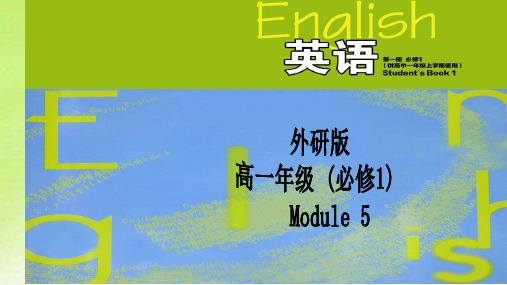

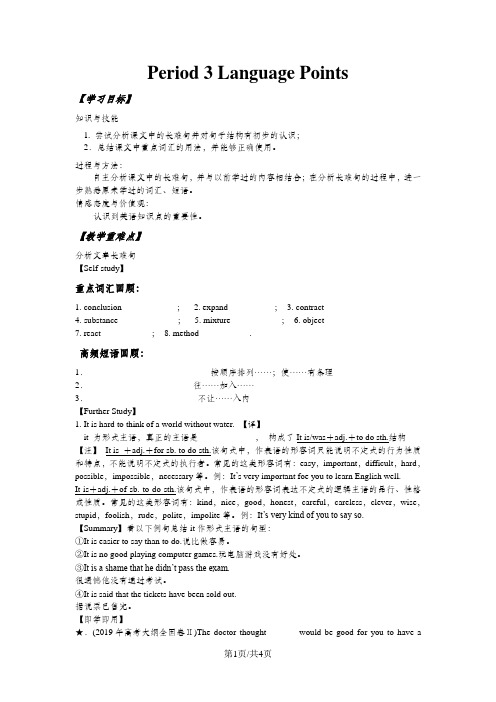
Period 3 Language Points【学习目标】知识与技能1. 尝试分析课文中的长难句并对句子结构有初步的认识;2.总结课文中重点词汇的用法,并能够正确使用。
过程与方法:自主分析课文中的长难句,并与以前学过的内容相结合;在分析长难句的过程中,进一步熟悉原来学过的词汇、短语。
情感态度与价值观:认识到英语知识点的重要性。
【教学重难点】分析文章长难句【Self-study】重点词汇回顾:1. conclusion ____________;2. expand __________;3. contract ___________4.substance _____________;5. mixture ___________;6. object ____________7. react ___________;8. method ___________.高频短语回顾:1._________________________ 按顺序排列……;使……有条理2._____________________ 往……加入……3.______________________ 不让……入内【Further Study】1. It is hard to think of a world without water. 【译】__________________________________it 为形式主语,真正的主语是_____________,构成了It is/was+adj.+to do sth.结构【注】It is +adj.+for sb. to do sth.该句式中,作表语的形容词只能说明不定式的行为性质和特点,不能说明不定式的执行者。
常见的这类形容词有:easy,important,difficult,hard,possible,impossible,necessary等。
例:It’s very important foe you to learn English well.It is+adj.+of sb. to do sth.该句式中,作表语的形容词表达不定式的逻辑主语的品行、性格或性质。
